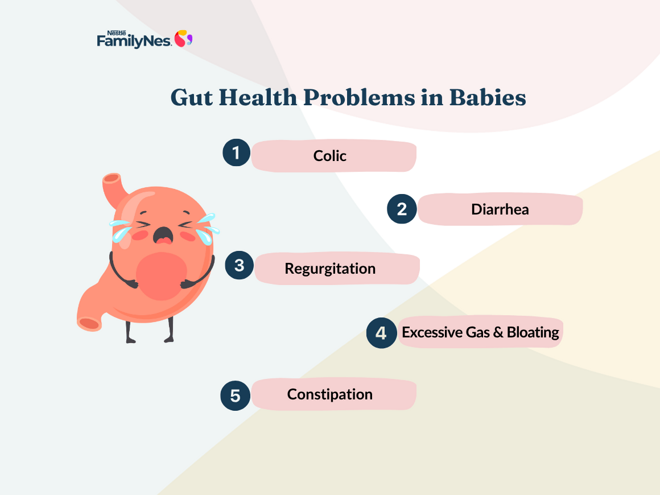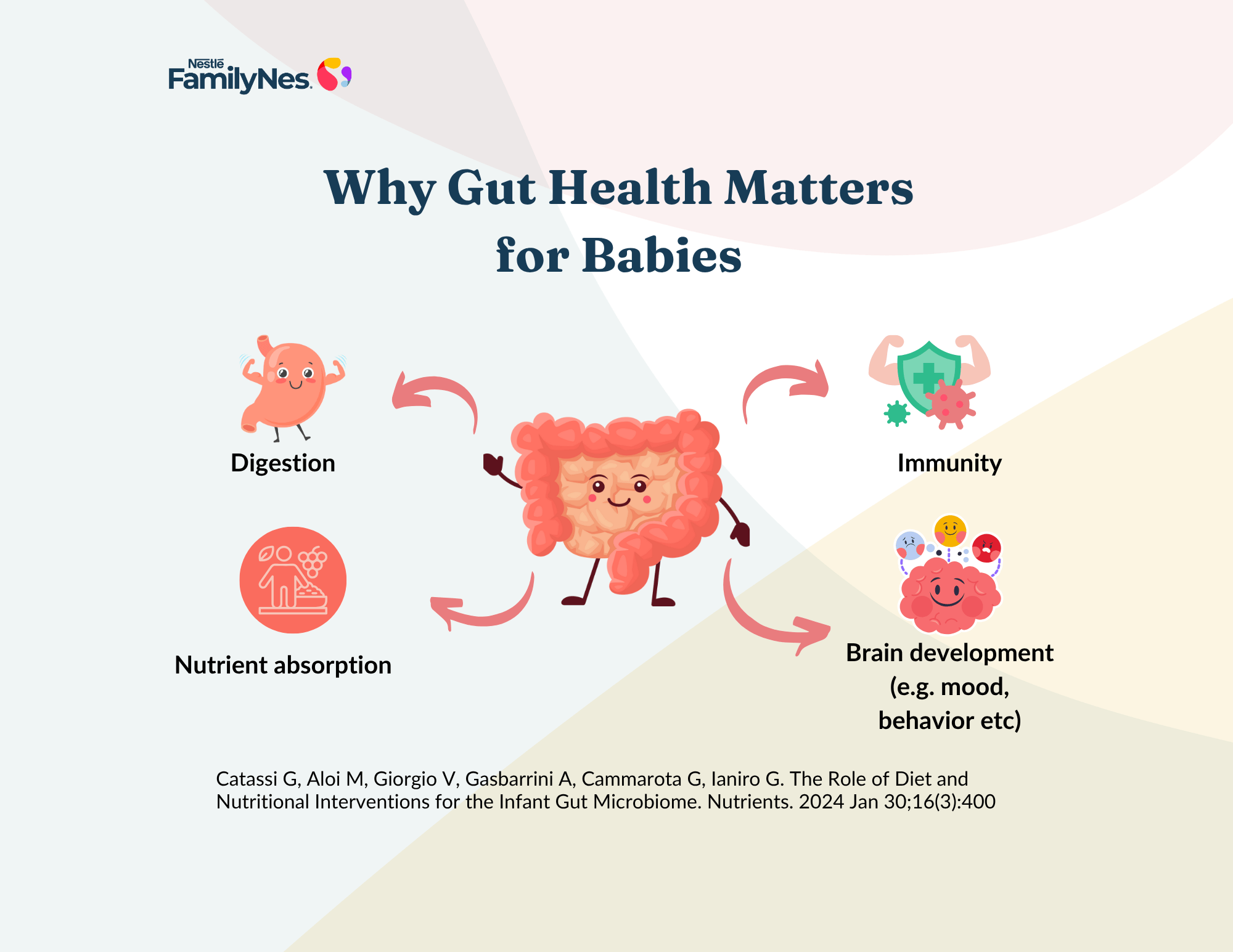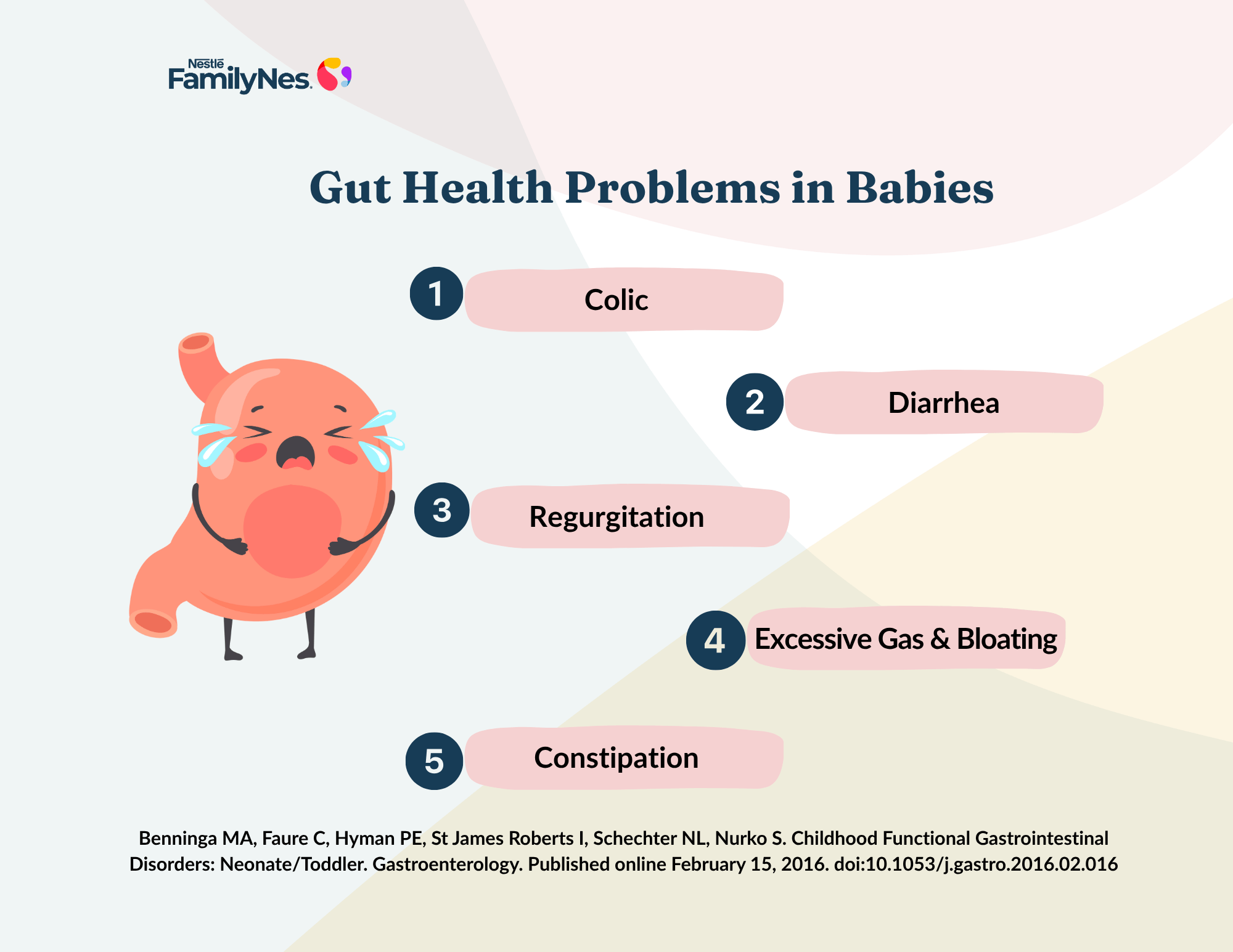
Why can gut issues cause discomfort in babies?
A healthy gut plays a vital role in the optimal growth and development of babies. This is due to the two-way communication between the gut and various other organs. However, since the baby’s digestive system is still maturing, gut health issues are common in early childhood, often causing discomfort and distress not only to the baby but also to the parents and caregivers. As a mother, it's natural to feel worried when your baby experiences these discomforts or pains.
What functions does a healthy gut perform in infants?
The gastrointestinal (GI) tract, or in short, “gut” in infants, is still developing after birth, making it susceptible to imbalances. The gut microbiome, a group of good and bad bacteria, plays a crucial role in digestion, immunity, nutrient absorption, and even brain/cognitive development.
The development of gut microbiome depends on several factors after the birth, e.g., if the baby was delivered cesarean or vaginal, exposure to antibiotics by mother or baby, choice of feed- breastmilk or formula, solid foods (after 6 months), family food as well as the complete environment surrounding the baby. The first two years thus become critical in shaping the gut bacteria composition and function. The gut microbiome starts mimicking that of an adult by 2-3 years old. Any disruptions or an imbalance between the good and the bad bacteria can cause discomfort and digestive issues in early chidlhood.1

What are the common gut health issues in babies?
1. Colic :
Colic is one of the most common concerns among new parents, marked by excessive, inconsolable crying for more than three hours a day, at least three days a week, for three weeks or more. It usually begins in the first few weeks of life, peaks around six weeks, and resolves itself by the time your baby is four to five months. While its exact cause remains unclear, gut microbiota imbalance, food intolerances, and immature digestive function may contribute to colic episodes.2

Signs & Symptoms to Look For 2:
- Intense, inconsolable crying (especially in the evening)
- Clenched fists and arching of the back
- Pulling legs toward the abdomen
- Bloating and gas buildup
2. Diarrhea :
Diarrhea is a condition in babies characterized by three or more loose stools per day or an increase in stool frequency or thin, watery consistency stools. Always remember that frequent and loose stools in breastfed babies are not always diarrhea. But a considerable increase in the thin and watery consistency or frequency may suggest diarrhea. It can be acute or chronic, with persistent diarrhea lasting over 2-4 weeks. It can lead to dehydration and malnutrition.3
Signs & Symptoms to Look For:
- More than three loose or watery stools per day
- Dehydration (signs such as dry mouth and reduced urination)
- Foul-smelling stools
- Fever and irritability
Diarrhea may result from viral, bacterial, or parasitic infections, food intolerances (such as lactose intolerance), or due to an antibiotic course. Diarrhea is also associated with an imbalance of good and bad bacteria.4
3. Regurgitation :
Regurgitation is the effortless spilling of stomach contents into the mouth and is the most common sign of infantile gastroesophageal reflux (GER). It consists of milk flowing from the mouth during or after feeding. Regurgitation should not be confused with vomiting. It can occur in healthy infants and is considered a normal part of early digestion. In most cases, regurgitation decreases as the baby's digestive system matures.5 In babies, a small amount of GER is normal and almost always goes away by the time a child is 18 months old.
4. Excessive Gas and Bloating:
Excessive gas and bloating are common gut health issues in infants and can result from swallowed air during feeding, an immature digestive system, or gut microbiota imbalances. Gas buildup in the intestines is normal in babies but can become stressful when it causes discomfort and crying.6
Signs & Symptoms to Look For:
- Frequent burping
- Fussiness after feeding
- Distended belly
- Pulling legs toward the stomach in discomfort
5. Constipation:
Constipation is defined as infrequent, hard, and painful bowel movements. It is common in case of changes in the diet of a baby. It is more prevalent if the baby is a toddler. Gut microbiota disturbances, lack of fibre, or an unbalanced diet are a few of the common causes of physiological constipation. In case of its severity or persistence, consult a pediatrician to rule out any developmental issue associated with it.
Signs & Symptoms to Look for:
- Hard stools that are difficult to pass or avoidance to pass stool
- Crying during bowel movements
- A bloated abdomen
- Reduced appetite,
- Decreased stool frequency (fewer than 3 bowel movements per week)7
When should parents seek medical advice?
- If your baby experiences diarrhea for more than 2 days or has chronic constipation, it may indicate an underlying gut disorder.
- Frequent vomiting, forceful spit-ups, or discomfort after feeding.
- Prolonged, inconsolable crying (more than 3 hours a day, over 3 days a week) may suggest gut dysbiosis.
- If your baby is not gaining weight as expected despite normal feeding and eating,
Gut health is crucial for a baby's overall health and well-being, not only for keeping the gut healthy but also to support various other developing organs like the immune system, brain & cognitive development, bone development, etc. Understanding the signs of gut issues can help parents take timely action. If you notice any signs & symptoms in your baby, consult your pediatrician for guidance.
References
1. Catassi G, Aloi M, Giorgio V, Gasbarrini A, Cammarota G, Ianiro G. The Role of Diet and Nutritional Interventions for the Infant Gut Microbiome. Nutrients. 2024 Jan 30;16(3):400.
2. Zeevenhooven J, Browne PD, L’Hoir MP, De Weerth C, Benninga MA. Infant colic: mechanisms and management. Nat Rev Gastroenterol Hepatol. 2018 Aug;15(8):479–96.
3. Viegelmann GC, Dorji J, Guo X, Lim HY. Approach to diarrhoeal disorders in children. Singapore Med J. 2021 Dec;62(12):623–9.
4. King CK, Glass R, Bresee JS, Duggan C, Centers for Disease Control and Prevention. Managing acute gastroenteritis among children: oral rehydration, maintenance, and nutritional therapy. MMWR Recomm Rep. 2003 Nov 21;52(RR-16):1–16.
5. Hegar B, Boediarso A, Firmansyah A, Vandenplas Y. Investigation of regurgitation and other symptoms of gastroesophageal reflux in Indonesian infants. World J Gastroenterol. 2004 Jun 15;10(12):1795–7.
6. Daelemans S, Peeters L, Hauser B, Vandenplas Y. Recent advances in understanding and managing infantile colic. F1000Res. 2018 Sep 7;7:F1000 Faculty Rev-1426.
7. Loening-Baucke V. Prevalence, symptoms and outcome of constipation in infants and toddlers. The Journal of Pediatrics. 2005 Mar 1;146(3):359–63.
8. Alipour Z, Duman H, Lee J, Karav S, Frese S. Chapter 3 - The microbiome in infant gut health and development. In: Ferguson BS, Frese S, editors. Nutrition in the Control of Inflammation [Internet]. Academic Press; 2025 [cited 2025 Feb 25]. p. 29–49. Available from: https://www.sciencedirect.com/science/article/pii/B9780443189791000034


